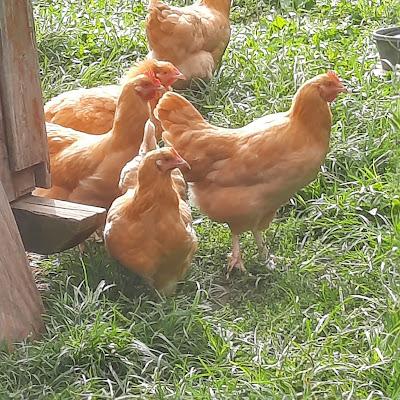Back in the late Fifties, before Ybor City, Tampa’s Latin
quarter, was a tourist magnet, back when it still had cigar factories, during
summers and Christmas vacations I worked in the bookkeeping department of the
Broadway National Bank. I was one of three employed in manually alphabetizing
checks as they came in, then giving them to the bookkeepers to post.
The Broadway was the
Ybor City branch of Tampa’s First National and my grandfather, after his
compulsory and unwelcome retirement at sixty-five as president of the First,
was given the presidency of the Broadway instead of a gold watch. He and I were
the only Anglos in the place. but our functions were respectively high and low
enough be well removed from the everyday business of the bank and our presence
did nothing to sully the pleasant Latin ambiance of the institution. Spanish
and Italian were the languages most often heard; the coffee in the lounge was
bitter black Cubano, and the lines in front of the tellers were
leisurely, giving everyone time to discuss the progress of Castro who was still
a rebel in the mountains of Cuba.
As I came to know my co-workers, I fell in love with them and
their ways. My closest friend was Viola, or Violin, as the others called her
when she was particularly noisy. She sat beside me at the check sorting table
and delighted in sharing tidbits about her life. She was in her early twenties
and lived with her parents—her father packed her lunch for her. Viola had been
married briefly, during which time she and her husband had lived in the
‘projects’ where, she told me, she had kept the shades down and walked around
naked in her apartment all day. I never learned why this idyll ended, but now
Viola was leading the life of a sheltered senorita, chaperoned to roller
skating lessons and to the dances at the Centro Asturiano by her father.
Viola and I were aided in our check sorting by Henry, a small angry
young man who aspired to the rank of teller but had made little headway in
impressing even the bookkeepers. Henry dressed carefully, like a young man on
his way up, but his appearance was marred by his over-lavish use of hair oil
and a bad case of acne. He was often the butt of the jokes of the male bookkeepers—except
for grandfatherly Carlo, the head bookkeeper, who was kind to him and patient
with his outbursts.
But Jesus, a serious, hard-working Cuban who would eventually
work his way up in the bank’s hierarchy, had no time for Henry’s ineptitude and
occasional histrionics. And Willie, a tiny emotional Puerto Rican, offered to
fight Henry at least once a day. Since Willie had actually been a featherweight
champion back in Puerto Rico, his challenge was never accepted. When feeling
especially aggrieved, Henry would talk about going to Cuba to join the
rebellion.
In these pre-computer days, accounts were kept on posting
machines, giant adding machines set on pedestals with partial surrounds and
attached seats which the bookkeepers mounted in the morning like knights going
to do battle. All day long there was a constant rattle of keys as we check
sorters rushed newly alphabetized stacks of checks to the busy warriors. As the
end of the day approached, the pace grew more frantic and the tension mounted.
Would they balance?
One by one the bookkeepers would finish, the ping of a
bell on each machine announcing a successful conclusion. At the end of a
triumphant day’s battle, Jesus and Willie would shout “Pelota!”—which my
elementary Spanish identified as ball, but which evidently meant balance
to them. If a balance was not achieved, usually Carlo or Jesus would go to the
rescue and help trace the missing numbers.
When Willie did not balance, he would routinely disappear into
the adjoining storeroom, from which we would soon hear loud thumps on the wall.
Then Willie would emerge, hands to his head and grimacing in pain. During the
day Willie often sang as he worked, and if Carlo, who liked quiet, reprimanded
him, would reply, “I sing to keep from crying.”
The female bookkeepers were Nora, Conchita, Angie, and Rose.
Rose was a tiny mousy woman who might have been anywhere from thirty to fifty
years old. She was very quiet, never entering into the joking and horseplay
that went on. From time to time she spoke quietly in Italian to Carlo but was
otherwise almost invisible. Then one day Rose came to work wearing lipstick and
seemed somehow to have dressed with a little more zip. During lunch Nora
explained the change: Rose was going to get married to a boy from Italy who
wanted to become a citizen. As the weeks went on, Rose became more and more
talkative, and we all learned how smitten she was with her ‘Johnny.’ I wondered
if she would be happy; we all knew that her Johnny was much younger than she.
But they married and eventually Rose became a mother, blooming into quiet
happiness.
Nora loved to talk and I loved to listen. She was only a
part-time bookkeeper, helping out with the check sorting when needed. Nora was
a hefty, pleasant-faced woman whose chief topic was her husband Raul. Raul was
from Cuba and had old-fashioned ideas about marriage. No matter that Nora
worked nine to five; Raul demanded homemade soup with his evening meal. Nora
told us gleefully that she bought Garcia’s Spanish Bean Soup, heated it up, and
he never knew the difference. “I throw the cans out in the alley so he won’t
see them,” she explained.
Conchita was the glamour girl of the department. Dark hair,
vivid red lipstick, high heels, she was always good to look at. Undoubtedly
plump, but her deep bosom and rolling hips were set off by an unexpectedly
narrow waist which was always accentuated by a wide belt.
One day I was in the lounge, sipping on my can of Metrecal,
part of an eternal quest to weigh less. Concha and Nora came strolling by and
looked in. “We’re going down to Cuervo’s for some lunch; come with us,” they
said.
Tempted but righteous, I lifted my can of Metrecal. “Thanks
but I’ve got this.”
They laughed. “Come on with us and get some arroz con pollo—you
can drink that when you get back.”
***
My life was enriched immeasurably by the time I spent in the
bookkeeping department. They were all so kind to me and if any resented that
I’d gotten the job through a family connection, I never felt it. When I
married, many of them came to the wedding and for years after that, whenever I
was back in Tampa, I’d go back to the bank to visit my friends.
On one occasion I was home to show off my second son who was
about six weeks old. I’d made the rounds in the bank and was outside on the
sidewalk, waiting for my grandfather. As I stood there with the baby in my
arms, an ancient Black man came slowly up the sidewalk toward me. He stopped
and wordlessly indicated that he wanted to see the infant. A little hesitantly,
I held the baby out so the old man could get a better look at him.
He studied the sleeping infant for a long minute, then uttered
a single word. “Ruler,” he said and continued on his leisurely way.
I was intrigued; was this a prophecy? I knew that Ybor City
was home to practitioners of Santeria and Voodoo; I myself had once gone into a
dim little place with the sign Herb Shop on the window and had found, not
parsley, sage, rosemary, or thyme but the ingredients for a mojo hand—High John
the Conqueror Root, Dragon’s Blood, and the like. So when this old man appeared
out of nowhere and named my son a ruler, I didn’t forget it.
I also didn’t mention it till maybe twelve years later. My
younger son was out of sorts, feeling that his older brother got all the
breaks. I remembered the old man and told the story. My younger son listened
eagerly, and I could see him beginning to stand a little taller and look a bit
masterful. I wondered if I’d done the right thing—maybe this was the way
Napoleon got started.
Quickly, I issued a disclaimer. “Of course, he could have said
‘Drooler’.”


















































